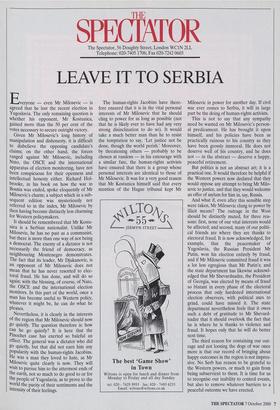SPECIATOR
The Spectator, 56 Doughty Street, London WC1N 2LL Telephone: 020-7405 1706; Fax 020-7242 0603
LEAVE IT TO SERBIA
veryone — even Mr Milosevic — is agreed that he lost the recent election in Yugoslavia. The only remaining question is whether his opponent, Mr Kostunica, gained more than the 50 per cent of the votes necessary to secure outright victory.
Given Mr Milosevic's long history of manipulation and dishonesty, it is difficult to disbelieve the opposing candidate's claims; on the other hand, the forces ranged against Mr Milosevic, including Nato, the OSCE and the international apparatus of election monitoring, have not been conspicuous for their openness and intellectual honesty either. Richard Hol- brooke, in his book on how the war in Bosnia was ended, spoke eloquently of Mr Milosevic's charm; a subject which in a sub- sequent edition was mysteriously not referred to in the index, Mr Milosevic by then having become distinctly less charming for Western policymakers.
It should be remembered that Mr Kostu- nica is a Serbian nationalist. Unlike Mr Milosevic, he has no past as a communist, but there is more than one way of not being a democrat. The enemy of a dictator is not necessarily the friend of democracy, as neighbouring Montenegro demonstrates. The fact that its leader, Mr Djukanovic, is an opponent of Mr Milosevic does not mean that he has never resorted to elec- toral fraud. He has done, and will do so again; with the blessing, of course, of Nato, the OSCE and the international election monitors. In this part of the world, once a man has become useful to Western policy, whatever it might be, he can do what he pleases.
Nevertheless, it is clearly in the interests of the region that Mr Milosevic should now go quietly. The question therefore is: how can he go quietly? It is here that the Pinochet case has exerted so baleful an effect. The general was a dictator who did go quietly, but that did not earn him any Popularity with the human-rights Jacobins. He was a man they loved to hate, as Mr Milosevic quite clearly is now. They will wish to pursue him to the uttermost ends of the earth, not so much to do good to or for the people of Yugoslavia, as to prove to the world the purity of their sentiments and the intensity of their feelings. The human-rights Jacobins have there- fore ensured that it is in the vital personal interests of Mr Milosevic that he should cling to power for as long as possible (not that he is likely ever to have had any very strong disinclination to do so). It would take a much better man than he to resist the temptation to say, 'Let justice not be done, though the world perish.' Moreover, by threatening others — probably to be chosen at random — in his entourage with a similar fate, the human-rights activists have ensured that there is a group whose personal interests are identical to those of Mr Milosevic. It was for a very good reason that Mr Kostunica himself said that every mention of the Hague tribunal kept Mr Milosevic in power for another day. If civil war ever comes to Serbia, it will in large part be the doing of human-rights activists.
This is not to say that any sympathy need be wasted on Mr Milosevic's person- al predicament. He has brought it upon himself, and his policies have been as practically ruinous to his country as they have been grossly immoral. He does not deserve well of his country, and he does not — in the abstract — deserve a happy, peaceful retirement.
But politics is not an abstract art; it is a practical one. It would therefore be helpful if the Western powers now declared that they would oppose any attempt to bring Mr Milo- sevic to justice, and that they would welcome an offer of asylum for him in, say, Russia.
And what if, even after this sensible step were taken, Mr Milosevic clung to power by illicit means? The outrage in the West should be distinctly muted, for three rea- sons: first, none of our vital interests would be affected; and second, many of our politi- cal friends are where they are thanks to electoral fraud. It is now acknowledged, for example, that the peacemaker of Yugoslavia, the Russian President Mr Putin, won his election entirely by fraud, and if Mr Milosevic committed fraud it was a lot less egregious than Mr Putin's; and the state department has likewise acknowl- edged that Mr Shevardnadze, the President of Georgia, was elected by means of fraud so blatant in every phase of the electoral process that only hardened international election observers, with political axes to grind, could have missed it. The state department nevertheless feels that it owes such a debt of gratitude to Mr Shevard- nadze that it should overlook the fact that he is where he is thanks to violence and fraud. It hopes only that he will do better next time.
The third reason for containing our out- rage and not loosing the dogs of war once more is that our record of bringing about happy outcomes in the region is not impres- sive. No Serb has reason to be grateful to the Western powers, or much to gain from being subservient to them. It is time for us to recognise our inability to control events, but also to remove whatever barriers to a peaceful outcome we have erected.


















































































 Previous page
Previous page